Search results
80 results found.
80 results found.
This weekend I had the unmitigated pleasure of meeting one of my foremost academic idols: Professor Jorgen Carling. I have followed his work on migration aspirations and his work informed much of the theoretical frame for my dissertation.
His research is thoughtful, pedagogic, built on extensive research in Cape Verde, and communicated in simple and straightforward prose in the top migration journals. But also, and this, of course, impresses me, on social media (@jorgencarling) as well as on his amazing blog, see this very useful post about academic publishing for instance.
While we have been connected over the internet, we have never met. He lives in Norway (and in Netherlands for a bit) and I am in Ghana, of course. Over the years, I have tried to get into workshops he has led, conference panels he has organized, but without luck. I have continued to keep him posted on my progress via email and sent him my dissertation once it was completed and passed the examination.
Then a few weeks ago I get an email with the subject: “Jorgen to Ghana”. I shriek with joy and can’t believe my luck when my academic idol of the last five years is coming to visit Tema. Finally on Saturday evening he lands. On Sunday, I pick him up from his hotel just minutes away from my house, show him around the center of the world (Tema), and invite him to eat a hearty Sunday lunch of boiled plantain and kontomire stew in my garden with my family.
Here is a photo from the happy occasion.
How was it meeting my idol in real life? He was cool.
Just as I had imagined he was calm and kind in a very Norwegian way. His comments on my work – I was very excited to realize he had actually read it – and careful advise on publishing helped me over some mind-hurdles. I was, however, a little nervous, kind of extatic and…wordy. So now, I have resolved to work on going from a far-away-fan to a useful and levelheaded colleague.
When did you meet an idol and what happened?
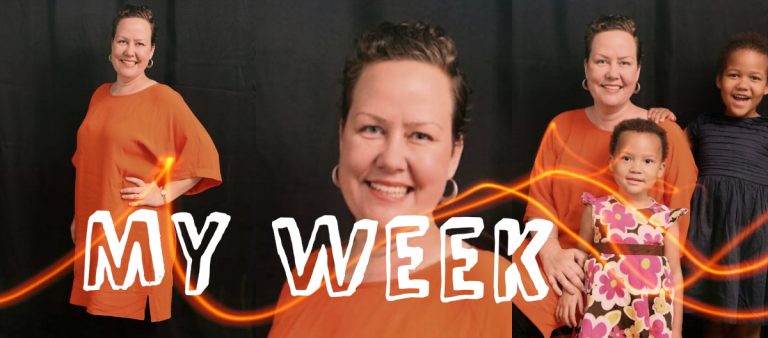
This week, I have a demanding and varied set of tasks ahead.
Monday, I will be welcoming guests to Ashesi University from Kenyon College, Ohio, US (Their 2020 plan is interesting and impressive). I am the Global Liberal Arts Alliance liaison for my institution and the visit is happening as part of that alliance. I will also be working on a research project on social media in the Ghanaian elections with a colleague to-be-presented at the upcoming African Studies AS-AA conference end of this month. I have a phone call related to the upcoming Uppsala University Global Alumni Day, I am part of organizing in Accra next month (UU alumn? Register here). Monday evening we have the Town Hall meeting at Ashesi for the fall semester.
Tuesday and Thursday I am teaching Written and Oral Communication at Ashesi to 80 Freshmen. This week, we will be talking about referencing in academic writing and how to use technology like Grammarly to write better. I will also grade their reflection paper. You can follow the course on social media under the hashtag #AshWOC. See posts for instance on Twitter. Instagram.
Wednesday, I’ll be working on a research project on higher education in Ghana and increasing university fees. I have a research assistant who is a former student and we have a meeting with an administrator at Ashesi who I think can help us. In the evening farewell dinner with the Kenyon delegation.
Friday morning, I will be talking to high school students at SOS Hermann Gmeiner International College here in Tema about diversity, using my own life as a starting point. I will also have a phone conversation with my mentor. In the afternoon, I will pick my daughters up from school. I am aiming at having a balance between my professional and family life, but rarely have time to pick them up from school, so value this opportunity to spend time with them and connect with their teachers.
Saturday and Sunday I will lay flat! Or something very similar like floating in a pool, resting in a hammock, or watching cookies rise in the oven.
What is your week like?
To be able to have a completely restful vacation, I took three weeks off social media this summer. What I intended was to not read or post anything on my three favorite social media platforms: Instagram, Twitter, and Facebook. As a total social media freak (I am someone who often hails social media as the revolution of our time), I was interested in this hiatus also from an experimental point of view: would it be difficult to keep off? Would I miss my social media timelines? My ubiquitous scrolling? What would be the effects?

The first few days
The first few days I kept a diary, this is what I noted:
Day 1 – I have set up my blog post on my social media break to post automatically in the morning, later in the day I went into Instagram in the evening to post the same info on my break. By mistake, I clicked the Twitter app. Closed it quickly. I have already deleted the Facebook app from my phone, now I put the remaining apps in a “social” folder on my phone and put it on the last screen, not the first. Regretted when I thought of the art exhibit I’ll attend tomorrow and the conference next week. Else felt happy. Baked, finished a book. Had a glass of wine. Watched a tv-program.
Day 2 – I have had a packed day and at the art exhibits and food fair I went to I wanted to post, that’s how I usually take in an event. Instead talked to a friend. It was good, but very different from how I usually experience such a happening.
Facebook sent me an email saying I had memories with my family. It felt a little bad to not see the memory, but also what a cheap trick that is to bring you in!
Day 3 – Methodically canceled all remaining social media app notifications. Went to a book club meeting and was present throughout. Watched in amazement when others drift away from the conversation with real people to check their screens all the time. In the evening, I had a question I wanted to post to my social media network. Later googled the question instead and found an answer.
Day 4 – I got messages from Odekro from parliament straight to my locked screen. Scrolled thru. That’s not strictly checking one’s timeline, right? I think this is because I “follow posts” on Twitter and I do not want to turn that off. (But really why not?)
Day 5 – I am spending more time on WhatsApp actually having conversations with people. At an outing, I took very few pics, because now that I can’t share them…I feel calm and cut off from reality.
Day 6 – I realize I have read no news since I stopped social media. I went to my blog to see if anyone had commented on my blog post about the social media break. But people rarely comment on blogs anymore. I was inspired to read my favorite Instagrammers’ blogs.
What I Learned
It is no surprise that notifications of Twitter, Facebook and Instagram are engineered to draw us in, have us watch just a few more photos on our timeline and just see one more video, but how difficult it was to get signed off from everywhere surprised me. If you want to dig deeper, I enjoyed this medium article: This is How or Fear and Outrage is Being Sold for Profit.
We sometimes talk about echo-chambers; this seems to certainly be true for me. Totally unconsciously, I have read or watched no news at all in the last weeks, but solely relied on my husband to tell me crucial headline stories. For a political scientist, this is major.
Few people called, I heard of few events, I saw few people these weeks. I realize I get most of my information about events and parties, art openings, and meetings thru social media. Perhaps not surprising, but also completely excluding, as one then have to be on social media to meet people offline.
When I was doing research on photo storage last year, I came across an article that said storage will be superfluous in the near future as what people want to do with pictures in to share them. This was true for me these weeks. When I saw something nice, I’d remember I would not get to share it for the next weeks, then I thought to myself, what is the point?
I thought I still need to be on WhatsApp (but really why? I could have set an away message) and have access to the Internet (you know, to…Google stuff). But those opportunities were exploited by my synapses (a.k.a. me) and I read many, many blogs, even had one or two late night surf-binges, and that was not what I had intended for my social media break. I think that is how I filled the “scroll-void” or the habitual social media checks.
New Habits
I will now more consciously decide when and how much I will be using social media. To be honest, as I am easing my way back into social media, I am feeling a little bit disgusted by the whole speed of all timelines, beautiful photos, and heated opinions. It seems they all flash by only to be replaced by another. When I started work this week, I have the following habits in mind:
Did Being Off Social Media Make Me Happier?
I did spend more time reading, sleeping, playing with my children, talking to my husband, but being off Social Media did maybe make me relax more, but not make me feel happier. I would have to say no, I actually felt sad!
Sad as I “couldn’t” share interesting things I experienced with the world, but at the same time the time off gave me some perspective on the way social media builds on human psychology and how, once the notifications come off, we can start using it for what we want again.
Have you ever taken a social media break? Do you limit your social media intake in some way? Let’s learn from each-other!
On Wed 26 July 2017, I was invited by the iHav Foundation to be a resource person at their training for youth leaders from the entire African continent.
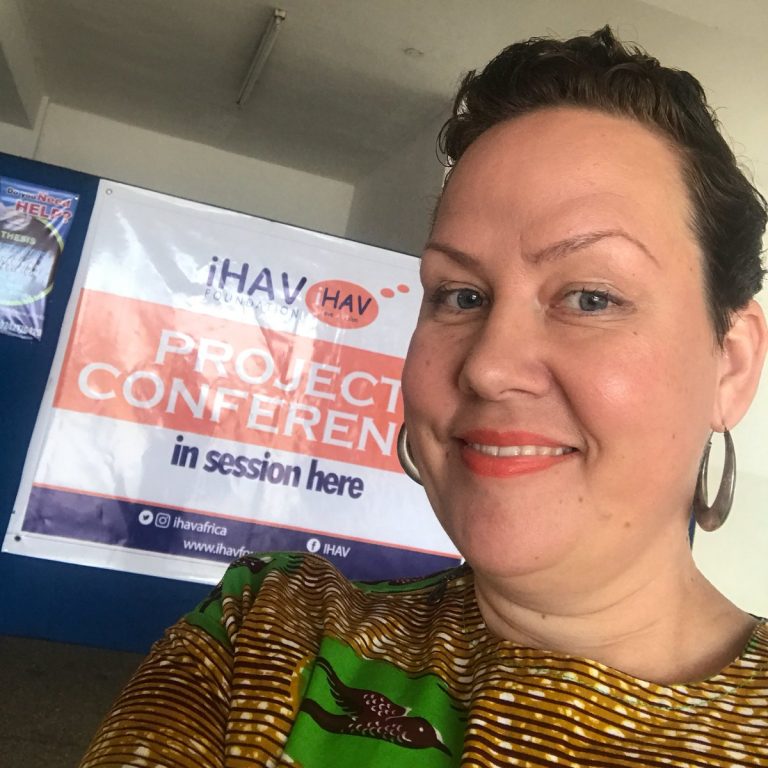
I was invited to talk on the topic of:
SOCIAL MEDIA AND ITS EMPLOYMENT OPPORTUNITIES
and ended up interacting with a smaller group of social media enthusiasts at the conference from five different countries: Kenya, Nigeria, Sierra Leone, Nigeria, and Ghana.
With my #iHAV2017 delegates @ihavafrica from Kenya, Nigeria, Guinea, Sierra Leone & Ghana after the Social Media breakout! pic.twitter.com/pK0ZWPi18m
— Kajsa Hallberg Adu (@kajsaha) July 26, 2017
We discussed how to control your social media presence and how to start a blog. This is the talk I had prepared:
————————————————————————————-
Have you ever asked your parents how they kept in touch with family and friends outside Ghana when they were your age? Let me tell you that you needed to take transport to the post office at Makola market around high street and order a call – for the next day!
10 years later, cell phone tech came to Ghana and a SIM card cost, guess how much? A monthly salary!
A monthly salary!
10 years later, Ghana had dial up Internet. Do you remember the sound of it? I think you are too young! Because today, 3/4 Ghanaians have mobile data subscription on their phone (NCA, 2017).
=revolution. Everything the World has access to online, we have access to as well. All opportunities. No excuses!
Three opportunities:
Google yourself. What happens?
For me, it’s
Wikipedia, YouTube, work website, my blog, Wikipedia, twitter, linked in – you can’t write about yourself in wiki (but everything else! join the Wikipedia community!) By the way, the coordinator for wiki libraries in the world(!) lives in Ghana and started up as a contributing writer for Wikipedia.
Most of these entries I have written/created myself! Then I have control over my online and social media presence.
Next level of controlling online presence is contributing to how your country and Africa is covered online. This is why I started BloggingGhana, to share the stories from Ghana and encourage Ghanaians to share our world. Another example is the Ghanaian hair app, Tress.It creates a community around something very important in our context, great hair!
2. Learning something online (Or teaching others):
how dance salsa, how do braid hair, How to Cook nigerian jollof to impress a Nigerian, how to . How to set up a blog. Just google it, watch some videos and you are ready to go. Skills can lead to new opportunities to make a living.
3. Doing work online
Is the last level. Although much work these days is actually done online: PR, communications, marketing, writing, journalism, music, art, e-commerce, we also have people who work remotely.
Many of us also use social media to build ourselves up, collect the work we do in one place (like a blog) but also use social media to discuss societal issues in Tweet-ups and Facebook-live sessions, help others, perhaps more as a calling as a business opportunity (one does not exclude the other though!)
Social Media Breakout session by @kajsaha at #iHAV2017 conference. pic.twitter.com/CPVy2eqHUR
— IHAV Foundation (@ihavafrica) July 26, 2017
Every time you go online, vow to produce as much as you consume!
I said it again: Every time you go online, vow to produce as much as you consume!
Thank you @ihavafrica for organizing this opportunity and meeting place #iHAV2017. As promised, I’ll post workshop key points on my blog! pic.twitter.com/ph8gpPk6ZU
— Kajsa Hallberg Adu (@kajsaha) July 26, 2017
We did not have so much time for Q&A, but one I remember was:
Q: How do I get more followers?
A (From both me and others in the group): Be useful, kind, promote others, share information, summarize events, ask questions, post photos.
Thanks again to Christabel Ofori and the team at iHAV Foundation for inviting me and creating such a useful platform for our future leaders.
African Open Data Conference 2017, or #AODC17 for short, was a five-day affair in Accra last week (or up to a week if you included some pre and post arrangements). I was there for two days, Tuesday and Wednesday, mostly because that is what my schedule allowed, but also because those days had the least of high-level dialogue – which is often not very productive – and I was more interested in African Open Data on the ground.
My observations:
1. The field of open data is exploding, the conference was a major to-do with buy in from Ghana’s president and many international organizations as well as several hundred delegates.
2. The networking was out of this world, among the most interesting people I met were academics Umaru Bah, Jeanne Holm, activists from BudgITng and Connected Development, blogger Chioma Agwuegbo, tweeps …students…old friends like Nnenna Nwakanma of World Wide Web Foundation, Nehemiah Attigah of Odekro (links for organizations or linked in profiles), Dorothy Gordon…
3. The individuals involved in Open Data are in much renaissance people, it is programmers-entrepreneurs-governance experts, professors-public servants, accountants-activists, story tellers-national security etc. I felt at home and got inspired to stop forcing expertise and continue on my “wide” career.
4. The base level of what constitute best practices in the open data space is not yet set, exemplified by that Government of Ghana can sponsor such a conference and yet not have passed the rather basic Right to Information bill (I learned at #AODC17 similar have been passed already by Nigeria: Freedom of Information, and Sierra Leone for instance). GovLab‘s “periodic table” (interactive link or see below) of Open Data captures what is needed beautifully. I just have one question: Now how do we go from talk shop to action?
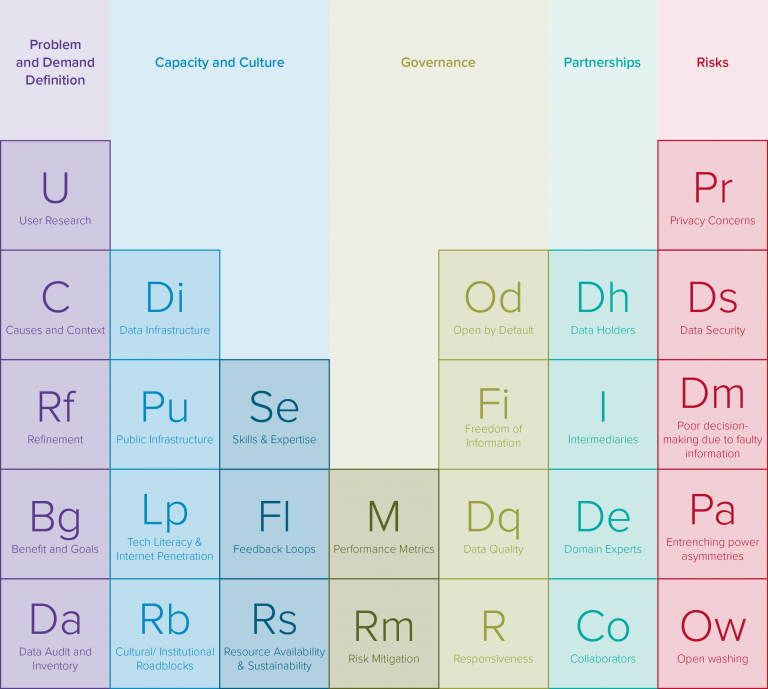
5. The events held about town were a good attempt at integrating the conference objectives with its surroundings, so to speak opening the data of the conference, something often overlooked in conferences.
In all, these were intense days for me, days I feel have impacted my life in a number of important ways both with inspiration, and network. See tweets and next steps/links below.
Tweets from #AODC17
Awkwardly, the International Conference Center in Accra is in darkness this 2ns day of the #AODC17. A stark reminder of our challenges! pic.twitter.com/CZzdGBmLLY
— Kajsa Hallberg Adu (@kajsaha) July 18, 2017
Productive ??cocoa break with @Fkoku and @kwazibruce, solving lack of awareness issues on the constitution and “fake news” #AODC17 pic.twitter.com/4eScMsL4KY
— Kajsa Hallberg Adu (@kajsaha) July 18, 2017
??Next #AODC17, I’m a co-moderator in an innovative education session to be held in ??Meeting Room 1 ??with @TungaMahadia @MorganOpenData pic.twitter.com/0RkhWA1zgJ
— Kajsa Hallberg Adu (@kajsaha) July 19, 2017
Next steps
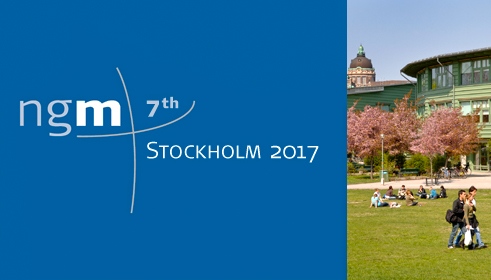
On Sunday, I’ll be in Stockholm for the 7th Nordic Geographers’ Meeting. I am excited to be presenting my work to a completely new audience – geographers, and a wider audience of social scientists – as I usually meet with Africa scholars or Migration scholars. The theme is “geographies of inequalities” which is almost a perfect topic to capture student migration out of the global South.
At the meeting, I hope to:
I’ll be presenting two papers out of my dissertation research for the following two panels:
Session A3: Youth and Inequality: Perceptions, experiences, and aspirations. (PDF details)
Conveners: Prof. Katherine Gough of Loughborough University and Dr. Thilde Langevang of Copenhagen Business School.
Session description
Rising unemployment and sluggish economic growth are widely predicted to further widen income and wealth inequality worldwide. Young people, in particular, are being disproportionately affected with the OECD claiming that youth have replaced the elderly as the group experiencing the greatest risk of income poverty. This has widespread implications for the opportunities and constraints young people face as well as impacting on their aspirations for the future.This session will bring together papers which explore how young people’s lives and aspirations are being influenced by the inequality they experience and imagine both in situ and in far–away places. Papers are welcome from societies across the globe where young people are being affected by real or perceived high levels of inequality. Topics which may be explored in the session include, but are not restricted to, the implications of rising inequality at a range of scales for young people’ perceptions, experiences and aspirations of: Mobility and immobility /Education and skills training/ Work experiences and job prospects/? Housing and home
Here my paper “Migration aspirations among university students in Ghana” will discuss my choices to focus on university students and not youth in general as well as aspirations and intentions and not migration per se . I also will share some results from the survey I did with university students in Ghana, in particular looking at social backgrounds of students and their view of migration. (20/6/17 1.15-3.00 pm. Room: William Olsson, House Y)
Session J7: The Politics of Movement. (PDF details)
Conveners: Dr. Nancy Cook & Prof. David Butz, Brock University.
Session description
The politics of movement – entanglements of power, social inequality and mobilities –– is an abiding preoccupation in social geography and critical mobilities studies. Both scholarly fields identify mobility as a fundamental structuring dimension of social life. They also demonstrate that the capacity for movement under conditions of one’s choosing is a valuable resource that is unequally distributed in social contexts structured by hierarchies of power. In other words, movement is socially differentiated; it reflects and reinforces structures of power to configure inequitable social hierarchies. Critical geographers and mobility scholars are tracing the ways in which relations of gender, race, class, sexuality and citizenship shape discourses and practices of mobility that produce beneficial movement for some people and too little or too much movement for others.
For this session, I will discuss some thoughts around what a global South student really is in relation to mobility in my paper “Conceptualizing academic mobility and mobility exclusions from a global South student perspective”. Based on the data I collected for my dissertation research I will suggest some trends in the politics of movement from a student point of view. (19/6/17 at 5.15-6.45 pm in Room: U26, House U)
I am also looking forward to keynotes, especially with Dr. Brenda S.A. Yeoh who has a distinct global South perspective in her work and meeting new friends – and at least one old! I want to thank my good friend Michael Boampong who sent me the initial info on this conference, and who is also attending the conference as well as and my department at Ashesi University which made this trip possible.
Hope to meet you at #NGM2017!
On 22 March 2017, the players in digital money in Ghana met and deliberated. Here is my report.




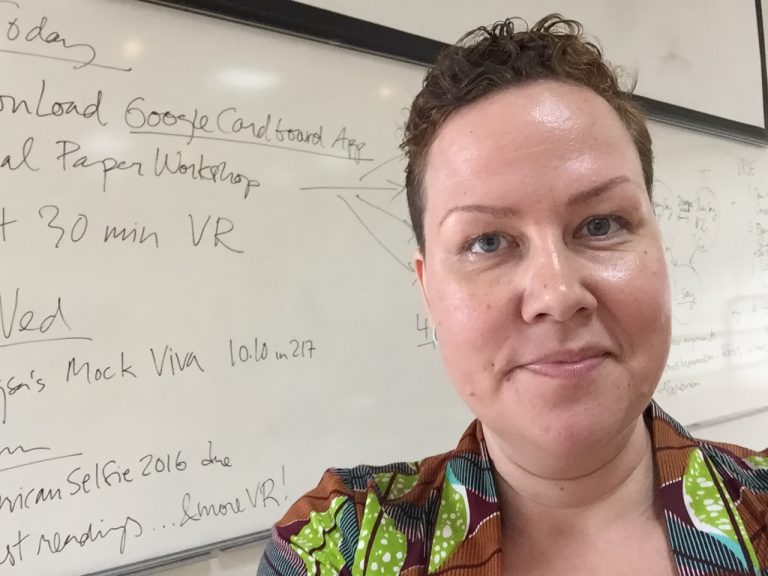 What a year!
What a year!
I started a project on virtual reality in the classroom with colleague Kabiru Seidu. I taught Social Theory and Written and Oral Communication.
I had my PhD viva and graduated. Whew!
I brought my readings and my kids to the blog which celebrated 10 years.
I was interviewed on a podcast and featured by Pulse in a video and wrote an article for a major Swiss newspaper (I am Swedish, not Swiss, so this I think is an achievement!)
I traveled to Dakar, Cape Coast, Sweden (twice, writing from an amazing xmas get-together in the cold just now!), Ohio and Pennsylvania, and Washington DC.
The world experienced Grand Bassam, Trump, Seinabo Sey, and Ghana its election.
Now I need to rest and come back in full force next year! See you in 2017!
This week, I am off to the 59th African Association Annual Meeting, this time held in Washington DC with the theme Imagining Africa at the Centre: Bridging Scholarship, Policy, and Representation in African Studies.
It will be my third African Studies conference this year after DakarFutures2016 and this summer’s GlobalGhana in Cape Coast. I also enjoyed last year’s ASA in San Diego. So, I am looking forward and over the next week I will be taking in as much as I possibly can on academic talks, networking sessions, book exhibits and also Washington DC! I am especially excited to meet up with a special person from DakarFutures working at the renowned Smithsonian National Museum of African Art and a new contact from Wikimedia Foundation. I’ll also visit Ghanaian Designer David Adjaye’s new National Museum of African American History & Culture, also in the Smithsonian Museum Park (photo from NMAAHC below, I believe it is the brown box next to the Washington Monument).
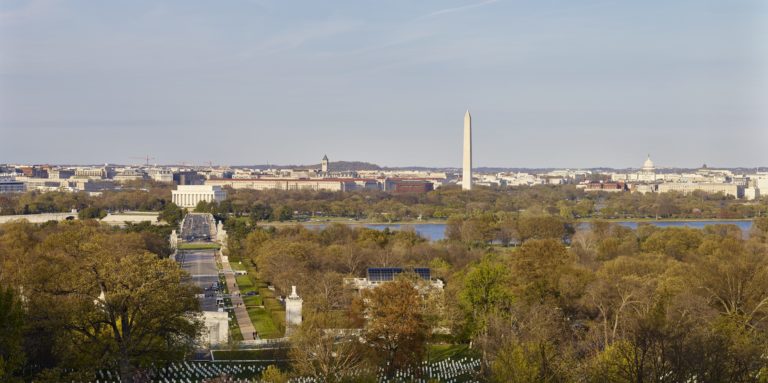
At the ASA2016 meeting, I will for sure be spotted when presenting a paper on higher education together with colleagues from the Ghana Studies Association and when I chair a so called Africa NOW! session on the ongoing election season in Ghana. Details below!
Panel: Debating the Quality and Relevance of (Higher) Education in Ghana
Fri 2 Dec, VIII-D-1 4pm.
My Work: Data for and from the Higher Education Sector in Ghana
In an era of knowledge economies and sustainable development, the importance of higher education has reemerged (Mkandawire, 2015; Teferra, 2014). However, current data on higher education institutions (HEI) in Africa is not easily available in terms of basic descriptive data on institutions, research output, faculty, staff, students, and alumni.
This paper is a first report from a case study to understand data collection in and analysis of the higher education sector in Ghana, a country that has a mix of public and private higher education. The methodology is literature review and interviews with key stakeholders to clarify the role in collecting and managing HE data by international university associations, GOG/ministry of education, state institutions, quality assurance bodies, and – on a local level – universities.
Data and analyses hold promise for nurturing this important sector, especially since the sector is growing quickly and is centrally placed politically. Two factors that also mean data ages quickly. For instance, the rise of private higher education since the 1990s provides an almost unmapped terrain in terms of data. With a decolonial approach, I argue that data on HEI must be open and free, but also made a government priority to solve the sustainability issues of collecting data and crafting relevant indicators for strategic and sustainable development of the higher education sector on the continent.
Africa NOW! Democratic Gains from Election Season 2016 in Ghana
Panel Introduction and Open Discussion Sat 3 Dec, 9-10 am in meeting room “Maryland A”.
Ghana is seen as a beacon of hope for the democratization process on the continent and has managed to consolidate its democracy further with each election since 1992. There has been peaceful handing over of power in 2000 and 2008, a contested election in 2012 which was settled peacefully in the supreme court. This year, several new developments including reforms, which have led to that only seven parties are contesting the presidential seat have taken place, Ghana also has a new Electoral Commissioner, Charlotte Osei, replacing Kwadwo Afari-Djan who served as the Chair of the Electoral Commission 1993 to 2015.
The surrounding world has also changed since the last elections, notably with terrorism threats closer to home with the attack on Cote D’Ivoire’s Grand Bassam, in Mali, Burkina Faso, and Boko Haram in Nigeria and Cameroon. Further, oil and commodity prices are at an all time low. Many countries in Africa are experiencing power shortages and Ghana in no exception. The US elections have also been extensively discussed in Ghana to the point of almost overshadowing a local debate.
Further, an important role in the relative democratic success in Ghana is played by media and civil society monitoring the electoral process. Many laudable initiatives providing platforms for education and debate have been implemented. This year, the threat of limiting the freedom of speech by for instance monitoring online conversations and shutting social media down during the elections which is has been discussed under the so called “spy bill” and by the Inspector General of the Police Service, have added another important issue to address by the civil society.
With this background, this panel will discuss what can be expected from the general elections on December 7, 2016, especially in terms of democratic gains or losses.
Panelists: Dr. Kajsa Hallberg Adu, Ashesi University (convener), Dr. Jeffrey Paller, University of San Fransisco, Prof. Gretchen Bauer, University of Delaware, and you!
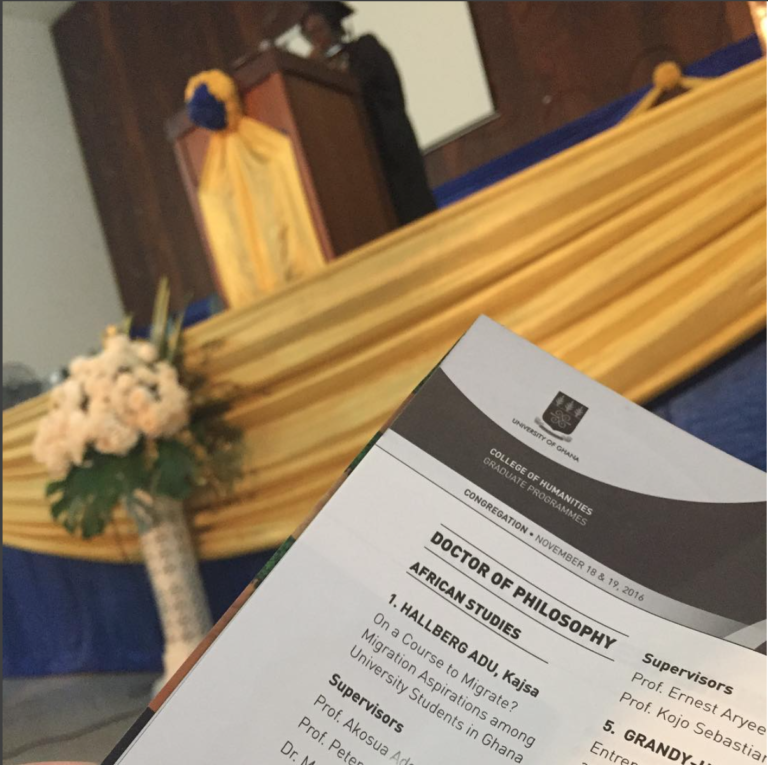
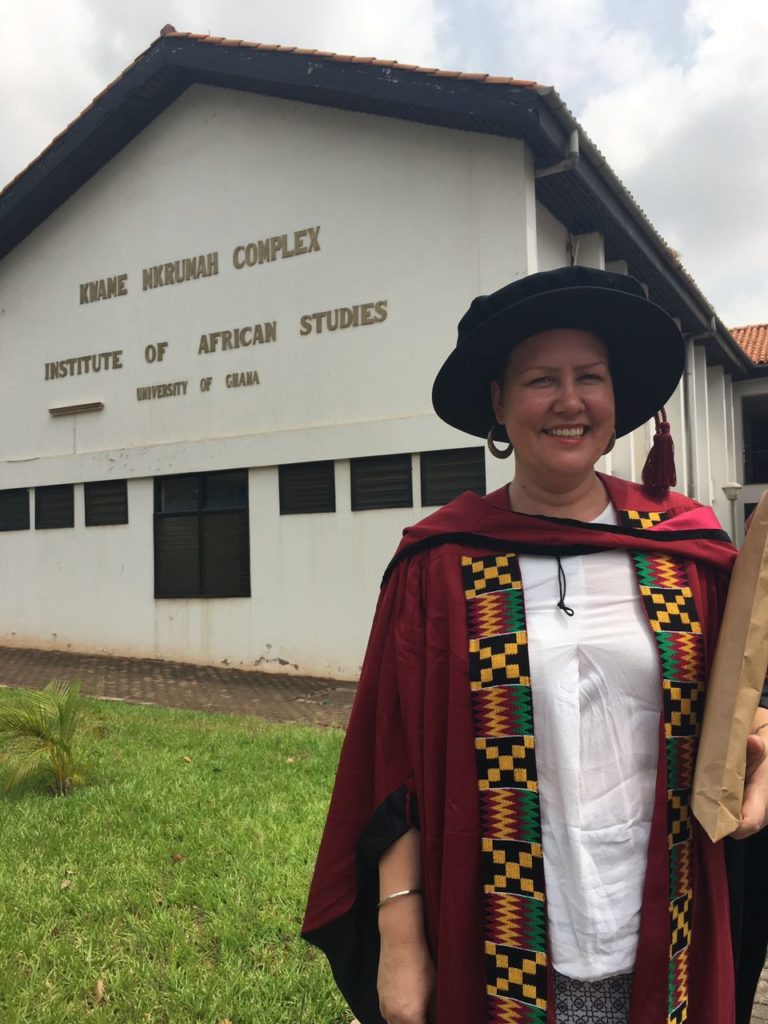 On Friday, I got my poofy hat which signifies that after five years of study, I have been awarded the degree of Doctor of Philosophy in African Studies. You have heard a lot about that already (and if you haven’t, its all here on the blog under the category PhD).
On Friday, I got my poofy hat which signifies that after five years of study, I have been awarded the degree of Doctor of Philosophy in African Studies. You have heard a lot about that already (and if you haven’t, its all here on the blog under the category PhD).
However, what you have not heard about is all the failures that led up to my PhD graduation. Here I am inspired by Princeton Professor Johannes Haushofer’s CV of Failures (PDF) (in turn inspired by Melanie Stephan’s article in Nature), who both argue that keeping and sharing a CV of failures can inspire others to be reminded that you have to just try again.
When starting to think about it, I see CV’s of failure everywhere. In my favourite Netflix Show, Chef’s Table the amazing chefs that cook the best food in the world all had to overcome obstacles and fail repeatedly.
When I recently read comedian Amy Schumer’s book with the hilarious title: The Girl with the Lower Back Tattoo, she devotes a chapter to “how to become a comedian” and it reads similar to an academic CV of failures. She did smaller gigs, sometimes so small that she had to find the audience herself on the street first, for 10 years before her break-though.
My favourite poet Wislawa Szymborska, also has some critical words on all the things a conventional CV hides (rediscovered courtesy of QZ): Preparing a Curriculum Vitae. She says:
“Write as though you have never talked with yourself.”
So, yes on Friday I wore a poofy hat and made it look simple. It wasn’t. So I will now talk to myself and to you and say: Here is my (likely incomplete) CV of Failures or Curriculum Mortem. Hopefully, it can inspire you to both keeping track of your own failures as well as when you fall, dusting yourself off and jumping in again.
CV OF FAILURES
Degree programs I did not get into
2010 PhD Economic Geography, Lund University
2009 PhD African Studies, University of Ghana (I was told my application was lost. I resubmitted the next year).
2007 PhD Political Science, Uppsala University
2003 Politices Magister, Uppsala University (I ended up getting the degree never the less but having to reapply every semester).
2002 BA, Stockholm School of Economics
Jobs I interviewed for but did not get…(Most of job applications got no response. However two jobs come to mind where I got to the interview stage, did fine – or at least that’s what I thought- , but still did not get the job).
Bank Switch Ghana, 2008.
Swedish National Audit Office, 2007.
Academic positions and fellowships I did not get
2013 Global South Workshop – a perfect workshop that would have given me a network and valuable input at the exact right time in my PhD.
2013 REMESO Workshop – A specialist workshop in my specialist field of migration aspirations organized in my home country of Sweden.
2013 Nordic Africa Institute PhD visiting scholarship (but despite not getting the money, I was invited for a one-month stay which I funded myself)
Awards and scholarships I did not get (or sometimes it does not help to apply again)
2013 Fredrika Bremer Förbundets Stipendiestiftelse
2012 Gemzeus Stiftelse
2011 Fredrika Bremer Förbundets Stipendiestiftelse
2011 Gemzeus Stiftelse
Research funding I did not get (most research funding I was not eligible for as belonging to the unusual group of Swedes in Ghana, hence I only applied to this one and did not get it).
2011 Codesria Small Grant
Conferences I was rejected to
ASA 2015 for the panel “Migration and Belonging in Ghana and Abroad.” (was later accepted for a general panel)
ECAS 2015 for the panel the panel “Epistemology of research on migration : the contribution of African studies” and “International migration and organised forms of collective resistance to barriers for entry and stay: perspective from Africa”. Yup, I applied to two and got none.
Migration Research Center at Koç University (MiReKoc), Istanbul, 2014
ECAS 2011
But hey, I jumped in again. That is what brought me to the poofy hat!
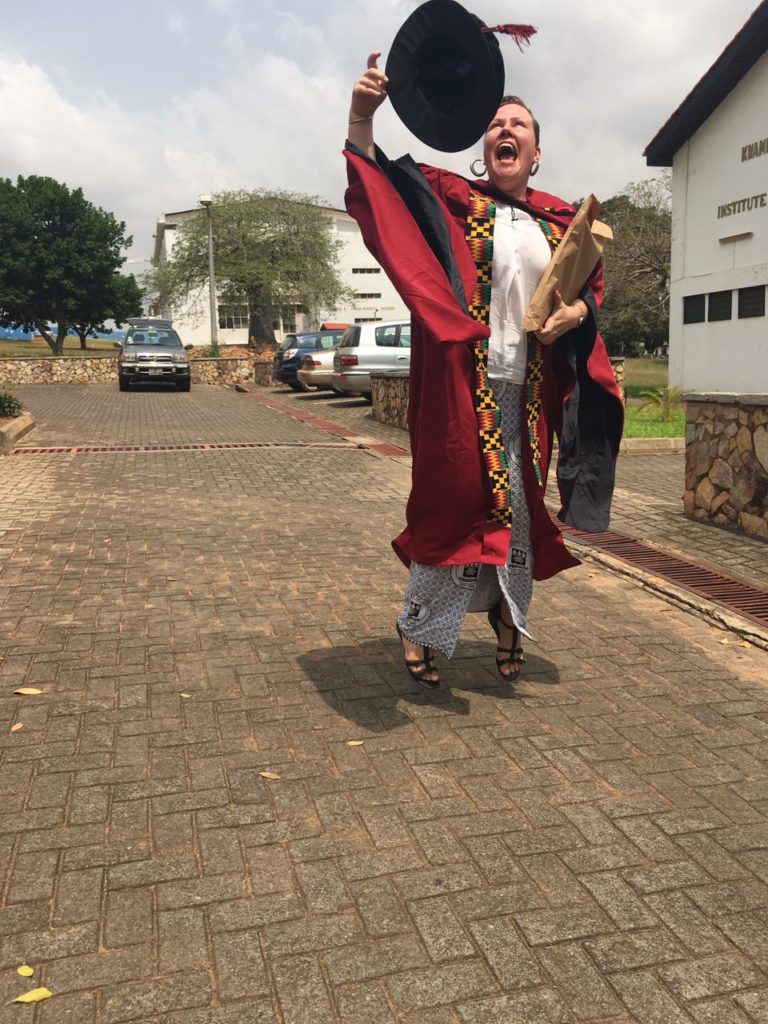
On Tuesday, I went to the tech fair Mobex16 in the Accra International Conference Center. I had only planned to swiftly stop by, but ended up staying all morning. Networking was great!
However, this blogpost is on some other observations I made in relation to Mobex16. I came with my phone, ready to tweet, and laughingly told a friend that I have been here for 8 min and already posted 3 tweets. I was on fire!
I tweeted about the registration and started taking photos for Instagram. I am a promoter of all things Ghana, especially tech stuff, and I was happy to share the experience with my now 9000+ followers on Twitter and 600+ followers on Instagram.
Just arrived at #mobex16. pic.twitter.com/PV26nFJIlQ
— Kajsa Hallberg Adu (@kajsaha) June 7, 2016
Registration #mobex16 as of now is 5 min. Sign up online to make the process faster!https://t.co/qQ6evAOuH1 pic.twitter.com/cnYZ3gfYqo
— Kajsa Hallberg Adu (@kajsaha) June 7, 2016
Selfie-time #mobex16 @edemrobby @attigs @fiifibaidoo pic.twitter.com/yQ1MyY2L8v
— Kajsa Hallberg Adu (@kajsaha) June 7, 2016
At this stage, I needed to charge my computer (as I really had plans of working out of an office) and with heavy tweeting during the opening and the president’s speech, my phone as well. Now there were no electrical sockets in the seminar room. I looked around and asked an usher. I tweeted about that.
Ironically no sockets for visitors #mobex16 – reminding us all that there is no digital economy without electricity! #233moments
— Kajsa Hallberg Adu (@kajsaha) June 7, 2016
After realising that no woman was to appear on the stage for the first two programs on the agenda or the entirety of my morning visit – the info I took from a information that was passed out to visitors, I tweeted about that.
Not a single woman on stage for the opening of #mobex16. None in the ensuing panel as well. Not cool, @mobexafrica. pic.twitter.com/1SzrpwVSSy
— Kajsa Hallberg Adu (@kajsaha) June 7, 2016
Revisiting my Twitter timeline, I was likely inspired by Omojuwa (recently named Africa’s best Twitter profile) and his tweet on female leadership:
There is a shortage of women in governance and public service. The earlier this is corrected the better for us as a country.
— JJ. Omojuwa (@Omojuwa) June 7, 2016
After I had left the seminar hall in search for power, I browsed the exhibit. Noticing that many Mobex16 stands did not really have a plan to engage with social media influencers, I talked to some exhibitors and tweeted about that.
Is your company social media marketing savvy at #mobex16 ? @PisenGhana were happy to see me and gave me this gift. pic.twitter.com/Yg4Gg9XkDi
— Kajsa Hallberg Adu (@kajsaha) June 7, 2016
You get my drift, I was engaging with the program, capturing both highlights and lowlights. Tweeting and Instagramming. Now some did not like that:
@kajsaha if #mobex16 scored 100%, then angels organised it. What’s your score for mobex?
— Ing. Clement Amole (@AmoleIng) June 8, 2016
Ironically I personally asked to help @kajsaha upon entry and she said, she didn’t need any help..hmm @mobexafrica https://t.co/JFOE98wyZS
— Alain Gbeasor (@alaingbeasor) June 8, 2016
@tailorMARIQUE Kajsa, you left the venue soon as the president left and didn’t sit through any of the sessions@newYorkcharlie @kajsaha
— #MallamsAndPastors (@EkOwMaIsSe) June 7, 2016
…and my personal favorite:
@kajsaha Why won’t you just appreciate everything.
I’m reviewing the #mobex16 and all I’m see is you criticizing everywhere.
Cmon— ?R (@Ryan_KmO) June 7, 2016
I get it, I have been an event organiser and its not necessarily fun to hear about someone’s negative experience when you have been working 24/7 to even make the thing happen, but I do listen and think to myself “how can I improve?” I also try to be mindful of that whoever takes the time to write to complain, cares a whole lot more than the people that just “come to eat”. (Caveat: I am not sure what the relationship between the people behind the sour tweets above is to the event discussed).
A few months back, Poetra Asantewa in an AccraWeDey-podcast said some very useful things about critique and how there is little room for it in the Ghanaian creative space. We just need to change that, so in the name of constructive critique, I’ll list some ideas for even better social media engagement for Ghanaian events below.
Tips for event organisers how to better engage with social media influencers:
Something like this:
Regina Honu is supposed to be on the next panel please https://t.co/uylJHPJNEo
— #MOBEX16|June7-9|ACC (@mobexafrica) June 7, 2016
What would you add to the list?
What I am most excited about right now is virtual reality. Taste the words. V-i-r-t-u-a-l r-e-a-l-i-t-y. Even VR for short has something! Together with alumni Jonathan Dotse and Kabiru Seidu and their company Nubian VR, and colleagues at Ashesi, I am running a project on bringing VR into the classrooms! So exciting!
We recently brought students, staff and faculty together to try it out! I said:
“I think Ashesi will in the next year use VR in a host of courses like French, Design and Entrepreneurship, Leadership, Written and Oral Communication and Text and Meaning. We can have morning class by the Eiffel tower in Paris, travel in a blood vessel through the body in the second period, fly after lunch, deal with an ethical dilemma in 360 degrees, and experience expressionist art in the world’s top museums or go to a refugee camp before the day is over. A challenge is that the sector is new, and content is still scarce. Hence we will also produce educational content for virtual reality.”
All you need these days to have an immersive or virtual reality experience is
This new revolutionary technology that came out of Oculus Rift’s crowd funding campaign which created a consumer base for VR and the Google I/O conference in 2014 which paired the smartphone with a cheap shell to lower costs and popularize VR. Oculus Rift was bought by Facebook in 2014 for 2 billion USD.
If you are interested to know more, listen to podcast Voices of VR, read the Wikipedia article on Virtual Reality, if in Ghana join VR-GH, and if at Ashesi, do come for our next session on April 20th in Lab 222!